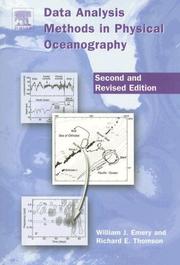| Listing 1 - 2 of 2 |
Sort by
|

ISBN: 0444507566 0444507574 9780444507563 9780444507570 1281050903 9786611050900 0080477003 9780080477008 Year: 2001 Publisher: Amsterdam : Elsevier,
Abstract | Keywords | Export | Availability | Bookmark
 Loading...
Loading...Choose an application
- Reference Manager
- EndNote
- RefWorks (Direct export to RefWorks)
Data Analysis Methods in Physical Oceanography is a practical reference guide to established and modern data analysis techniques in earth and ocean sciences. This second and revised edition is even more comprehensive with numerous updates, and an additional appendix on 'Convolution and Fourier transforms'. Intended for both students and established scientists, the five major chapters of the book cover data acquisition and recording, data processing and presentation, statistical methods and error handling, analysis of spatial data fields, and time series analysis methods. Chap
Oceanography --- Observations --- Data processing. --- Research --- 57.08 --- Oceanography, Physical --- Oceanology --- Physical oceanography --- Thalassography --- Earth sciences --- Marine sciences --- Ocean --- Biological techniques. Experimental methods. Equipment --- 57.08 Biological techniques. Experimental methods. Equipment --- Data processing --- Research&delete& --- Oceanography. --- Analyse des données --- Océanographie --- Analyse des données --- Océanographie --- Time series analysis
Digital
ISBN: 9780080477008 0080477003 Year: 2001 Publisher: New York Elsevier
Abstract | Keywords | Export | Availability | Bookmark
 Loading...
Loading...Choose an application
- Reference Manager
- EndNote
- RefWorks (Direct export to RefWorks)
Data Analysis Methods in Physical Oceanography is a practical reference guide to established and modern data analysis techniques in earth and ocean sciences. This second and revised edition is even more comprehensive with numerous updates, and an additional appendix on 'Convolution and Fourier transforms'. Intended for both students and established scientists, the five major chapters of the book cover data acquisition and recording, data processing and presentation, statistical methods and error handling, analysis of spatial data fields, and time series analysis methods. Chapter 5 on time series analysis is a book in itself, spanning a wide diversity of topics from stochastic processes and stationarity, coherence functions, Fourier analysis, tidal harmonic analysis, spectral and cross-spectral analysis, wavelet and other related methods for processing nonstationary data series, digital filters, and fractals. The seven appendices include unit conversions, approximation methods and nondimensional numbers used in geophysical fluid dynamics, presentations on convolution, statistical terminology, and distribution functions, and a number of important statistical tables. Twenty pages are devoted to references. Featuring: & bull; An in-depth presentation of modern techniques for the analysis of temporal and spatial data sets collected in oceanography, geophysics, and other disciplines in earth and ocean sciences. & bull; A detailed overview of oceanographic instrumentation and sensors - old and new - used to collect oceanographic data. & bull; 7 appendices especially applicable to earth and ocean sciences ranging from conversion of units, through statistical tables, to terminology and non-dimensional parameters. In praise of the first edition: "(...) This is a very practical guide to the various statistical analysis methods used for obtaining information from geophysical data, with particular reference to oceanography(...) The book provides both a text for advanced students of the geophysical sciences and a useful reference volume for researchers." Aslib Book Guide Vol 63, No. 9, 1998 "(...) This is an excellent book that I recommend highly and will definitely use for my own research and teaching." EOS Transactions, D.A. Jay, 1999 "(...) In summary, this book is the most comprehensive and practical source of information on data analysis methods available to the physical oceanographer. The reader gets the benefit of extremely broad coverage and an excellent set of examples drawn from geographical observations." Oceanography, Vol. 12, No. 3, A. Plueddemann, 1999 "(...) Data Analysis Methods in Physical Oceanography is highly recommended for a wide range of readers, from the relative novice to the experienced researcher. It would be appropriate for academic and special libraries." E-Streams, Vol. 2, No. 8, P. Mofjelf, August 1999.
| Listing 1 - 2 of 2 |
Sort by
|

 Search
Search Feedback
Feedback About UniCat
About UniCat  Help
Help News
News